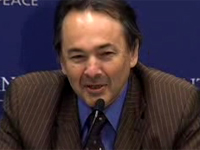Registration
Thank you!
You will receive an email confirming your registration.
The world witnessed the clash of two great narratives after 9/11: the neo-conservative Grand War on Terror narrative as constructed by the Bush administration, and the Jihad through Martyrdom narrative as constructed by al-Qaeda. The failure of both narratives presents new challenges for the Obama administration which will find itself operating in an increasingly multi-polar world. In addition, the role of Europeans countries and their models of democracy become increasingly important particularly as the center of gravity in the Middle East moves toward the Gulf.
French Scholar Gilles Kepel discussed this topic and his new book Beyond Terror and Martyrdom alongside comments from Max Rodenbeck and Daniel Brumberg. Karim Sadjadpour moderated the discussion
Iran’s Role in the Clash of Narratives:
Kepel stated that relations with Iran are the first issue the Obama administration will have to address. The newly reshuffled Middle East faces two crises: one in the Levant and one in the Gulf. Iran’s influence on Hezbollah in Southern Lebanon and in Iraq makes it a key player in the future politics of the region. Kepel stressed that the Iranian system is ripe for a post-Ahmadinejad era if only because of its catastrophic situation domestically, which in turn will push Iran to negotiate with the U.S.
Europe’s Role in the Clash of Narratives:
Because of their industrial and financial capacity, cultural influence, and institutions of learning, European states can provide a tremendous base of stability in the Arab world. The European model of democratization has a strong effect not only on Turkey, but also other states such as Morocco. The European countries can be important players in addressing the Gulf countries’ security problem.
Daniel Brumberg argued that because the Obama administration is looking beyond the Middle East to Pakistan and Afghanistan, it will downgrade its democracy-promotion efforts. Because of these different priorities, European countries must be prepared for a new president that may not share their agenda entirely.
Failure of Clash of Civilizations Narrative:
Max Rodenbeck argued the clash of the two narratives did not only lead to the failure of both, but also to the overall failure of the larger Clash of Civilizations narrative. This is because it is the claims for representing the civilizations – rather than the civilizations themselves – that clashed, without managing to mobilize the masses on either of their sides.
Questions and Answers:
In the question and answer session the speakers further analyzed integration issues in Europe, the role of Saudi Arabia in the clash of narratives, and the nature of its relationship with the United States.
